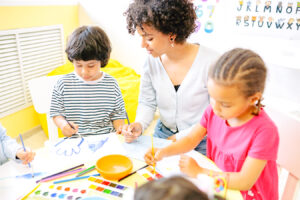Back to: Religion and National Value JSS2
Welcome to class!
In today’s class, we’re going to be talking about the family as a primary social group. I trust you will enjoy the class!
The Family as a Primary Social Group

The family is considered the fundamental unit of society and the first social group to which we belong. It plays a crucial role in shaping our values, beliefs, and behaviors.
What is a Primary Social Group?
A primary social group is characterized by close, personal, and enduring relationships. Members of such groups interact frequently and have a strong sense of belonging.
Characteristics of the Family as a Primary Social Group
– Intimacy: Family members share intimate and personal relationships.
– Support: Families provide emotional, financial, and physical support to each other.
– Socialization: The family is the first place where children learn social norms and values.
Roles and Responsibilities within the Family

– Parents: Provide care, nurture, and guidance. They are responsible for the physical and emotional well-being of their children.
– Children: Learn from their parents and elders, help with chores, and respect family rules.
– Siblings: Offer companionship, share responsibilities, and support each other.
The Impact of the Family on Society

– Cultural Transmission: Families pass down traditions, languages, and cultural practices.
– Community Involvement: Families contribute to community activities and support local initiatives.
– Economic Contribution: Family members work and contribute to the economy.
Examples of Family Dynamics
– Nuclear Family: Consists of parents and their children living together.
– Extended Family: Includes relatives like grandparents, aunts, uncles, and cousins.
– Single-Parent Family: One parent raising children, showcasing the diversity of family structures.
Challenges Faced by Families
– Economic Hardship: Financial difficulties can strain family relationships.
– Health Issues: Illnesses can impact the family’s dynamics and responsibilities.
– Social Changes: Modern lifestyles and technology can alter traditional family roles.
Promoting Healthy Family Relationships
– Communication: Open and honest discussions can strengthen family bonds.
– Quality Time: Spending time together through activities and meals.
– Mutual Respect: Valuing each member’s opinions and feelings.
We have come to the end of today’s class. I hope you enjoyed the class!
In the next class, we shall be discussing Culture and Social Values.
In case you require further assistance or have any questions, feel free to ask in the comment section below, and trust us to respond as soon as possible. Cheers!
